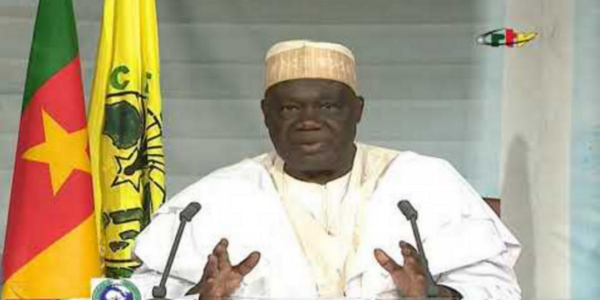Cameroon has lost one of its most enduring statesmen. Luc Ayang, President of the Economic and Social Council (CES) and a former Prime Minister, has died in Belgium after a long illness.
The news of his passing was first reported by L’Oeil du Sahel, which stated that the veteran politician and traditional ruler breathed his last on Tuesday, October 14. Sources close to his family confirmed that he had been receiving medical treatment in Belgium for several weeks.
Ayang Luc, who ruled as the traditional chief of Doukoula-Karhay in the Far North Region for the past 17 years, was widely respected both as a statesman and a community leader.
Born in 1947 in Doukoula, Mayo-Danay Division, Luc Ayang rose from humble beginnings to become one of the most familiar faces in Cameroon’s public administration. He served briefly as Prime Minister from August 1983 to February 1984, before being appointed by President Paul Biya to head the Economic and Social Council — a position he held for over four decades.
Throughout his tenure, Ayang was known for his quiet, disciplined approach to governance. French magazine Jeune Afrique once described him as “the invisible dinosaur” of the Biya regime — a man who preferred discretion to the spotlight but whose influence was deeply rooted in the country’s political system.
As head of the Economic and Social Council, Ayang oversaw consultations between government, employers, and workers’ unions, playing a key advisory role on national development policies.
In March 2025, he made one of his last public appearances when he presided over the inauguration of the Council’s new headquarters in Yaoundé’s Dragages neighborhood.
Tributes have begun pouring in from across the nation. Senior officials and traditional leaders have hailed him as a symbol of loyalty, integrity, and institutional continuity.
“Luc Ayang was a true servant of the state — calm, loyal, and devoted to the nation’s progress,” said a senior government official in Yaoundé.
Funeral arrangements are expected to be announced soon.
With Ayang’s passing, Cameroon loses not only a pillar of its political establishment but also a traditional leader who bridged modern governance with cultural heritage.

